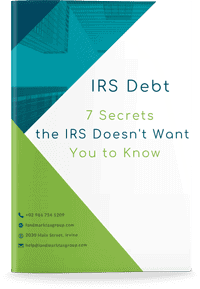11 Tips for Taxpayers Who Owe Money to the IRS
According to the Internal Revenue Service, most taxpayers get a refund from the IRS when filing their tax returns. For those who don’t get a refund, the IRS offers several options to pay their tax bill. For those taxpayers who can’t full pay their tax balance, the IRS has options for them, too. Here are 11 tips for taxpayers to get you started on your journey towards a resolution:
1. Tax Bill Payments If you get a bill from the IRS that shows you owe back taxes, you are expected to promptly pay the tax owed including any penalties and interest. If you are unable to pay the amount due, it may be better for you to get a loan or borrow the money to pay the bill in full rather than to make installment payments to the IRS. That’s because the interest rate and penalties the IRS must charge by law are often higher than what lending institutions may be offering.
2. Payment Options The IRS offers several ways for you to pay your bill, including online, by phone, and by mail. Learn how to pay some or all of your IRS tax bill here.
(CA Residents: How to Make Payments to the California Franchise Tax Board (FTB))
3. Additional Time to Pay Based on your circumstances, you may be granted a short additional time to pay your tax. A brief additional amount of time to pay can be requested by calling the IRS the phone number on your most recent IRS notice or letter. There generally is no set up fee for a short-term agreement. Don’t feel comfortable speaking with the IRS? We can request an extension for you. Simply contact us here and we’ll explain how during your free consultation.
4. Reduce Penalties and Interest Taxpayers facing large tax liabilities often see their debts increase significantly due to added penalties and interest. The IRS often applies various penalties and interest to unpaid back taxes making it more difficult for taxpayers to pay their federal tax debt. These penalties are mandated by the U.S. Tax Code and are most commonly assessed against taxpayers for nonpayment or underpayment of taxes, failure to timely file a tax return, and failure to make payroll tax deposits (for businesses). In addition to interest that accrues on any unpaid tax, interest is also charged on the penalties themselves. It is always best to ask the IRS to remove all penalties and interest to help reduce your overall balance. See some of our recent penalty removals here.
5. Installment Agreement You may request an installment agreement if you cannot pay the total tax you owe in full. This is an agreement between you and the IRS to pay the amount due in monthly installment payments. You must first file all required returns and be current with estimated tax payments or withholding. If an installment agreement is approved, a one-time user fee will be charged by the IRS. The user fee for a new agreement is $105 or $52 for agreements where payments are deducted directly from your bank account. For eligible individuals with lower incomes, the fee can be reduced to $43. See some of our recent installment agreements here.
Get our Free Special Report: 7 Secrets the IRS Doesn’t Want You to Know!
6. Offer in Compromise The IRS is now offering more flexible terms with its Offer-in-Compromise (OIC) Program. An OIC is an agreement between a taxpayer and the IRS that settles a taxpayer’s tax debt for less than the full amount owed. An OIC is generally accepted only if the IRS believes, after evaluating the taxpayer’s financial situation, that the tax debt cannot be fully paid via a lump sum or through a monthly payment agreement. A proper evaluation and presentation of your financial picture to the IRS is critical in getting an Offer (aka tax settlement) accepted. See some of our recent settlements here.
7. Fresh Start The IRS has a program to help struggling taxpayers get a fresh start. Through the Fresh Start program, individuals and small businesses may be able to pay the taxes they owe without facing additional or unnecessary burdens, such as a tax lien, bank levies, and wage garnishments. See some of our recent fresh start agreements here.
8. Tax Liens The IRS will typically want to file a tax lien on past due tax liabilities. A tax lien is the government’s way to secure its interest in your assets and facilitate collection of your tax liability. After a lien is properly filed, the government has a right to all of your property, as well as any property or rights to property you acquire thereafter. Once its interest in your property is secured, the government can levy or seize your property as a means of collection. In addition to the prospect of a levy or seizure, taxpayers will often witness a significant decline in their credit score and an increase in difficulty in obtaining a loan or line of credit. Taxpayers have various options when it comes to stopping a proposed lien filing or having an already-filed lien released. We regularly prevent and release liens for our clients.
9. Check Withholding When your federal tax return is completed, you may discover that you owe money to the IRS. If the amount due is substantial, it’s probably time for you to review your withholding election. If you owe a large amount of tax, you may need to increase the amount of taxes being withheld from each paycheck you receive. Taxpayers who have a balance due year after year may want to consider changing their Form W-4, Employee’s Withholding Allowance Certificate, with their employer. This will help to prevent another tax liability in the future.
10. Check Estimated Taxes If you do not have taxes withheld from your income, you may need to make estimated tax payments. This may apply if you have income such as self-employment, interest, dividends or capital gains. It could also apply if you do not have enough taxes withheld from your wages. If you are required to pay estimated taxes during the year, you should make these payments to avoid a penalty. If you are self-employed, be sure to make all of your estimated tax payments to avoid owing the IRS on tax day.
11. Current Compliance Taxpayers who owe the IRS should be aware that negotiating with the agency cannot commence until they are deemed in “current compliance” with their federal tax obligations. This means you must first file all required returns (even if you owe) and be current with estimated tax payments or withholding. Before the IRS can consider a tax settlement or a payment plan, the agency will demand that these prerequisites are met. Meeting this requirement will establish “goodwill” with the IRS and help to facilitate a favorable outcome of your tax dispute.
See: 10 Things to Know About the IRS Collection Process
See: How to Respond to an IRS Notice
See: How Tax Relief Works
Get our Free Special Report: 7 Secrets the IRS Doesn’t Want You to Know!
Not only are we licensed Tax Relief Specialists, we are also former Senior IRS Agents that now serve the best interests of taxpayers like you – all we do is handle IRS Tax Relief matters, all day, every day. Speak to us for FREE at (949) 260-4770.
For more information on IRS back taxes, see our Back Taxes page or contact us now at (949) 260-4770 for a CONFIDENTIAL consultation with our former IRS Collection Agents.
We look forward to serving you.
More Tax Tips















